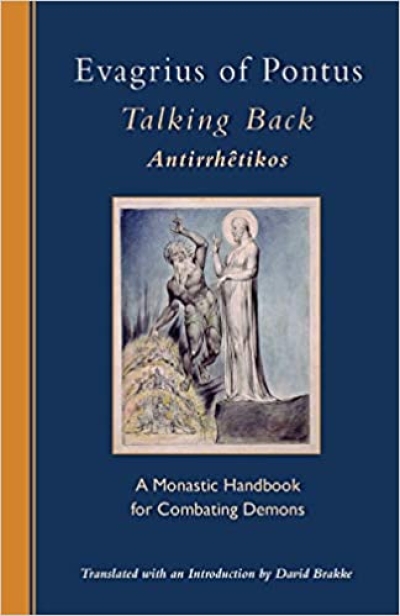This is an unusual book but worth bringing to people’s attention due to it having a significant mention in Comer’s Live No Lies, which was reviewed in PT some weeks ago. Comer’s book points out the value of speaking out scripture as part of our warfare against the lies of the evil one and commends Evagrius’s treatise for that purpose.
Who was Evagrius?
Born around 345 AD, Evagrius of Pontus was regarded as a leading spiritual guide among the monks of the Egyptian desert, an honoured father to other monks. This book, or rather treatise, was his most popular piece of writing, regularly mentioned by other ancient authors and seen as particularly helpful to other monks.
It was eventually translated from the original Greek into several other languages, including Latin and Syriac. Here we have an English version, translated by David Brakke, a professor in Religious Studies at Indiana University.
Talking back to whom?
The title ‘Talking Back’ comes from the Greek ‘antirrhetikos’, which can mean refutation or contradiction, indicating the need to counter particular thoughts (logismo) which can be seen as demonic in origin and against which a monk may be struggling. This explains the subtitle of the English version, A Monastic Handbook for Combating Demons, where it should be realised that what is being fought against are not demonic beings as such but the way in which they influence our behaviour by planting certain thoughts in the mind. Bible verses are powerful in opposing this strategy and can combat all forms of temptation.
What is being fought against are not demonic beings as such but the way in which they influence our behaviour by planting certain thoughts in the mind.
For those who are unfamiliar with this approach it should be stated that Evagrius is simply building upon what Jesus and others in the Bible did as a matter of course, using the words of scripture as a weapon to fight off wrong desires. Repel the thought to prevent the deed. The Word of God is indeed as powerful as a two-edged sword and choosing certain scriptures to target specific thought patterns can break through the demonic strongholds of false ideas. This use of scripture was, for Evagrius and the monks at the time, the best way to remain pure and sustain faith, better than composing prayers of their own.
Against 8 temptations
The treatise starts with a prologue, after which Evagrius arranges his work into eight sections, one for each of the main temptations: gluttony, fornication, love of money, sadness, anger, listlessness, vainglory and pride. In total there are 498 carefully selected biblical passages, each preceded by a description of what it can be used to combat. These typically start with ‘Against the thought of . . .’ or ‘Against the thoughts that . . .’, but can also begin ‘Against the demon that. . .’ or ‘Against the soul that. . .’, the last of these referring to what our own soul might be desiring that is ungodly.
Evagrius arranges his work into eight sections, one for each of the main temptations: gluttony, fornication, love of money, sadness, anger, listlessness, vainglory and pride.
It is this format which sets it apart from other anthologies of scripture that existed at the time. These words are being addressed not to other people or even oneself, but to the demonic powers behind the thoughts. Equally, these verses are not for meditation in advance but for declaration once in the battle in question.
Scripture responses
Evagrius’s firsthand experience of demonic combat forms the primary source of his authority. He lived a long time in the desert, successful but also humble in his faithfulness to the monastic life. He was an avid reader of the Bible as an ascetic practice, and so he can be trusted to have selected from the entire Bible the words that are most suited to each conflict, even though these words may be scattered and difficult to find.
Brakke’s translation has a useful introduction which helps to explain what the book is about and upon which I have drawn extensively for this review. Before the main text there are two letters between Loukios, a more junior monk, and Evagrius, which explain the origin of the treatise. Loukios wrote to Evagrius as an “honoured father, who has become an experienced combatant against the spirits of wickedness”, entreating him to compose such a treatise and classify the scriptures in the fight against the beings of darkness. Evagrius replies that he has done what has been requested and has sent it on to him.
Overall this is a curious book from a bygone age but it is more than a curiosity.
More than a curiosity
The English version contains a useful Bibliography for those wanting to know more about Evagrius, his life and works, and related monastic matters. There is also a substantial index of scripture passages used as responses, plus a separate smaller one of those verses quoted outside of the main text, namely in the Prologue and the two letters.
Overall this is a curious book from a bygone age but it is more than a curiosity. Our battles are essentially no different from theirs, so the book’s purpose and value remain valid for us today.
Talking Back (190pp) is published by Cistercian Publications and is available from Amazon for £14.95 inc p&p (kindle £7.79)
